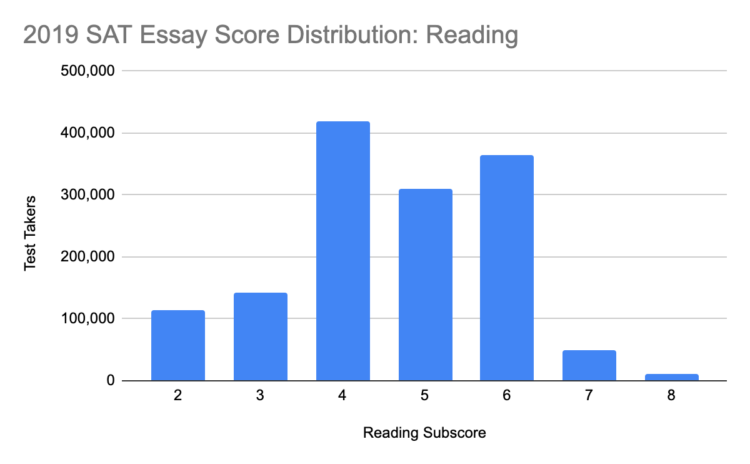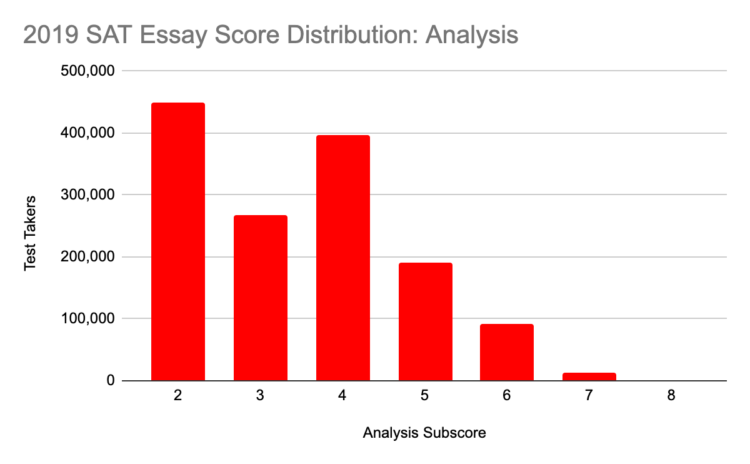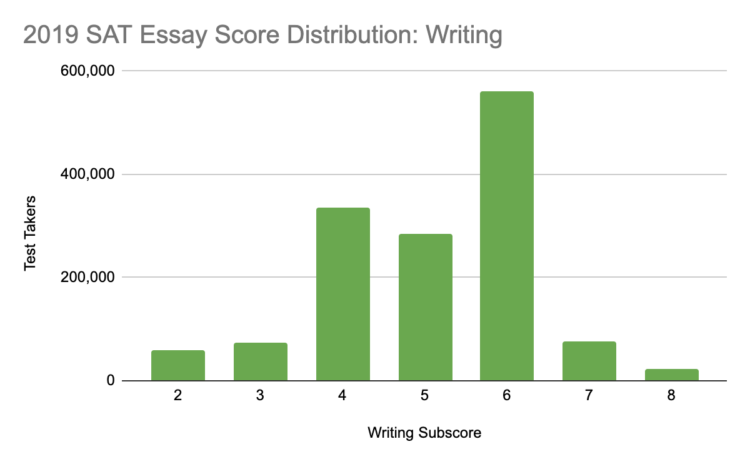What is a Good SAT Essay Score?
Students taking the latest version of the SAT have a lot of questions about the Essay section in particular. When the College Board redesigned the SAT in 2016, the Essay section was the aspect of the test that changed most substantially. As a result, it is the section that is least understood. Keep reading to learn how we approach setting a good target score for this often enigmatic section of the SAT. Students taking the optional Essay section are provided with a written argument and asked to analyze it. Check out the College Board’s example prompt with sample graded responses to get a sense of what the exam looks like. This is the only optional section of the SAT. It does not impact your overall score out of 1600. Instead, your Essay grade stands alone on your score report. While the College Board does not require the SAT Essay, certain schools do. Additionally, these schools do not require the SAT Essay but recommend it. We recommend taking the Essay section just in case you want to apply to one of the schools that requires or recommends it. If you’re absolutely sure you won’t apply to any of these schools, you can skip it. Just know that you can’t retake the SAT essay alone, so if you change your mind and want to apply to a school that requires the Essay section, you’ll have to retake the whole test. Your essay will be evaluated on three criteria—Reading, Analysis, and Writing. The Reading grade is meant to gauge how well you understand the passage content. Did you absorb the information you just read? Especially when the details are not intuitive, your readers will be checking to see that you read closely and caught the nuance of the piece. The Analysis score relates to how well you represented the argument that the writer made. Your goal in the Essay section should be to determine what the writer’s main argument is and describe how they present it. Finally, your score in Writing reflects your own command over the English language. Your capacity to write clear, well-structured sentences that use a wide range of vocabulary will determine this grade. Two readers each give the essay a score between 1 and 4, depending on how well each reader thinks you did in the three categories. Their grades are then summed to give you a three-part grade. The highest grade you can receive is 8, 8, 8, while the lowest possible score is 2, 2, 2. To give an example, one student may score a 5, 4, 4, which would mean that their readers submitted the following feedback: In 2019, the mean score on the Reading and Writing for the SAT Essay was a 5. For the Analysis section, the mean score was a little lower at 3, simply because Analysis is a skill that high school students spend less time honing than Reading or Writing. For a detailed breakdown of how 2019’s test takers performed, here are a few score distributions: Here’s a rough breakdown of the percentile scores based on the most recent College Board data. Here’s how this chart works: say you scored a 6 on the Reading section. According to the data, that means that you performed better than 70% of other essay writers. SAT Essay Score Percentile Rankings Source: College Board and CollegeVine data analysis Unless your SAT Essay score is rock-bottom, you should not feel the need to retest just to improve your Essay score. If you received a low score that you feel isn’t representative of your writing abilities, focus on crafting stellar college essays instead of retaking the SAT just for the Essay section. If you were unhappy with your SAT Essay score AND your overall SAT score, however, then you should consider retaking the test with the Essay section. Here are a few tips on how to improve your SAT Essay score: 1. Annotate the passage. Read carefully. Start by boxing the main argument of the passage, then put a star next to three or four places where the author employs a strategy to win the readers over. These may include: 2. State the main point of the passage author. Make it clear that you understand what the author is trying to say by stating their thesis clearly in your essay response. No one reading your essay should have any doubt as to what you think the main point of the passage is. Make the author’s thesis clear at the beginning of your response as well as in your concluding paragraph. Tie back to it often within your body paragraphs too. 3. Outline before you write. Spend 3-5 minutes organizing your thoughts. Build up 2-4 points about the argument’s structure. Think of yourself as a debate coach. Give feedback on the persuasion tactics the author used. Which ones were most effective? What could they have done to sway their audience even more? Remembered the strategies you starred when you were annotating? These are the building blocks of the author’s argument, and your essay should provide analysis of how effectively these building blocks were used. 4. DO NOT include your personal opinion. The essay exists to assess whether you can analyze an argument. It has nothing to do with your personal views. If you find yourself defending or disagreeing with the passage, that is a good sign that you are missing a chance to analyze the argument’s structure. 5. Proofread your essay. Give yourself 2 minutes towards the end of the section to improve the language you used. Search for spelling and grammar mistakes, as well as weak word choice. Replace monosyllabic words like “good” and “is” with more dynamic vocabulary, such as “striking” or “constitutes.” This is a quick and easy way to boost your Writing score. For more advice on how to study for the Essay section, check out our How to Get a Perfect Score on the SAT Essay and The Ultimate Guide to the New SAT Essay. Want to know how your SAT score impacts your chances of acceptance to your dream schools? Our free Chancing Engine will not only help you predict your odds, but also let you know how you stack up against other applicants, and which aspects of your profile to improve. Sign up for your free CollegeVine account today to gain access to our Chancing Engine and get a jumpstart on your college strategy!

What Is the SAT Essay?
Is the SAT Essay Required?
Schools that Require the SAT Essay
Schools that Recommend the SAT Essay
Should You Take the SAT Essay Section?
How Is the SAT Essay Scored?
Category
Reader A
Reader B
Reading
3
2
Analysis
2
2
Writing
2
2
What’s a Good, Average, and Bad SAT Essay Score?
 Source: College Board
Source: College Board Source: College Board
Source: College Board Source: College Board
Source: College Board
Score
Reading
Analysis
Writing
8
99
99+
98
7
96
99
93
6
70
93
53
5
48
79
33
4
18
51
9
3
8
32
4
2
0
0
0
How Should You Understand and Improve Your SAT Essay Score?


